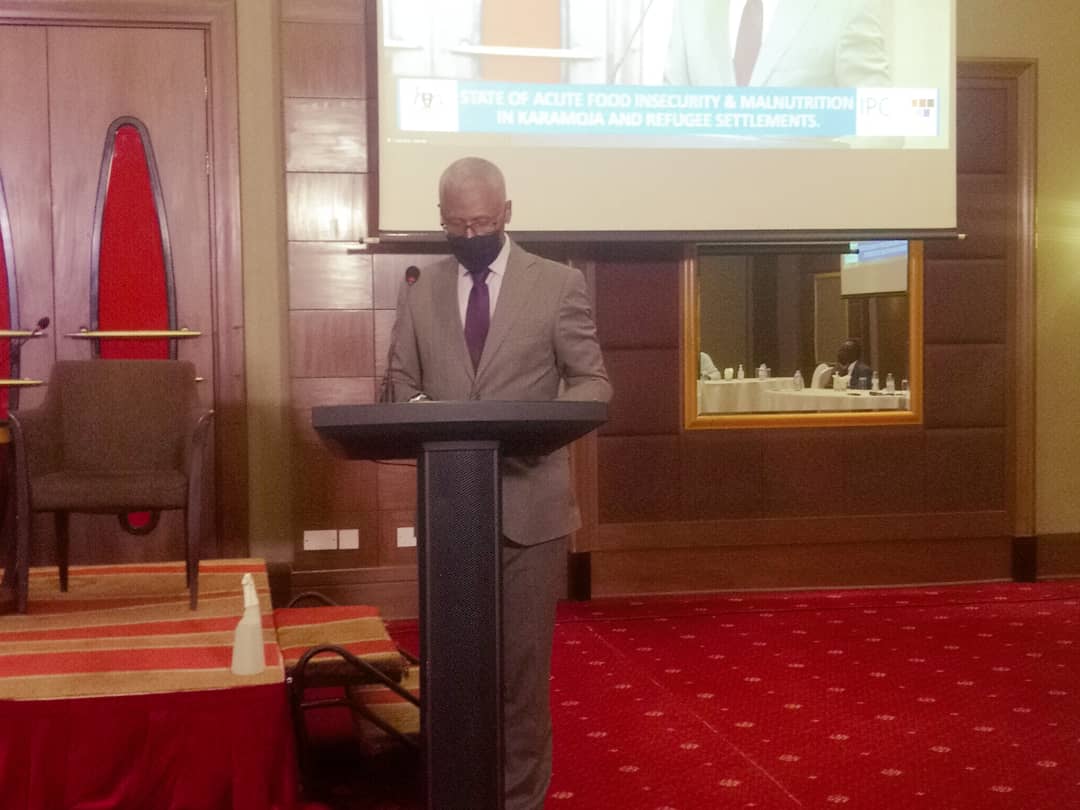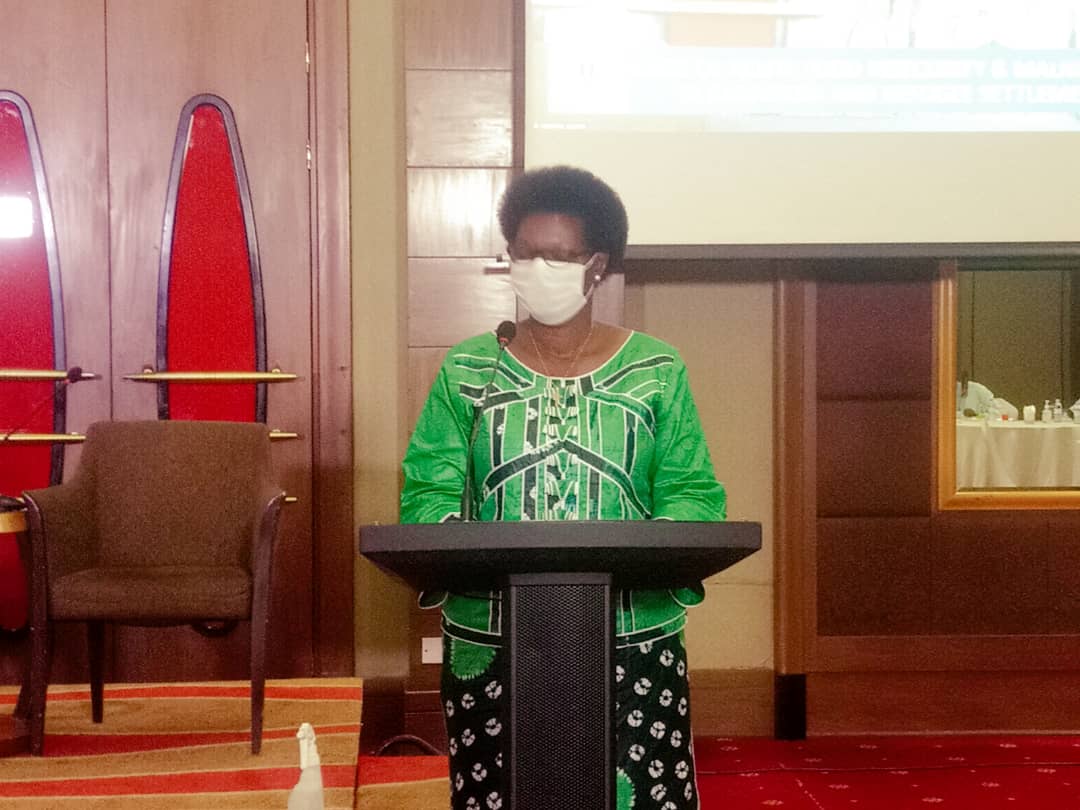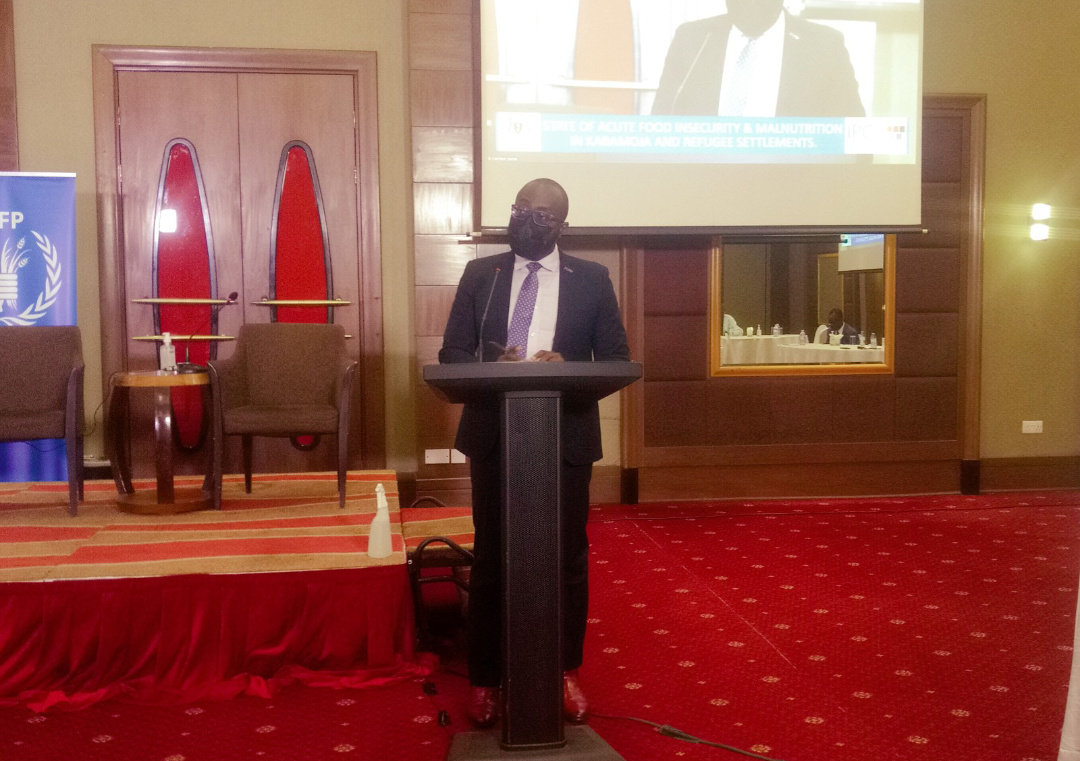
KAMPALA – Dr. Antonio Querido, the representative of Food and Agriculture Organization of the United Nations (FAO), in Uganda has urged leaders to rethink and innovate solutions to transform food systems from the ways in which food is produced, processed, packaged and transported to the ways in which it is distributed and consumed.
“We need sustainable solutions to the recurrent problem of food insecurity at country, regional and international levels.”
Dr. Querido said that there is much data that shows that Uganda produces sufficient food but there are pockets of food scarcity in the country and some regions like Karamoja suffering from acute hunger.
Dr. Querido was speaking at the launch of the Integrated Food Security Phase Classification (IPC) acute food insecurity and acute malnutrition analysis of Karamoja and 14 refugee settlements in Uganda, on 5 August 2021 at Kampala Sheraton Hotel.
The IPC analysis was produced by the World Food Programme (WFP) and Food and Agriculture Organization of the United Nations (FAO), in partnership with district local governments, the Office of the Prime Minister, the Ministry of Agriculture, Animal Industry and Fisheries, and the Ministry of Health.
At a function officiated by the Minister of State for Relief, Disaster Preparedness and Refugees, Ms Esther Anyakun, Dr. Antonio revealed that while COVID-19 has affected the entire country, areas like Karamoja, which have preexisting vulnerabilities such as high poverty levels, have been seriously affected.
“In the recent past, Karamoja has also experienced Desert Locust infestation, flooding, prolonged dry spells and food scarcity. These shocks are by no means without stress on the population and its resources.”
“The results we are here to disseminate today are very significant. They indicate that families in Karamoja will only have about 50 percent of their nutritional needs. About 361,000 people, 30 percent of the region’s population, is either in the crisis or emergency phase of acute food insecurity. The Karamoja Global Acute Malnutrition rate, which shows malnutrition status in emergency settings, is 19 percent,” he said.
Minister Anyakun in her part urged development partners to double efforts, complimenting Government in improving access to safe and nutritious food in Karamoja, and address the negative impacts of climate change.

“Karamoja is one of the regions in Uganda that is most prone to various disasters and shocks. From diseases that affect cattle and people to insecurity caused by persistent raids and a harsh climate that affects food security, we must do everything within our means to change the situation for the better, Ms Anyakun said.
“The analysis shows that Karamoja’s poverty rate is 61 percent – three times the 21.4 percent national poverty rate. We must not leave anyone behind in our pursuit for development. It is time to do more for Karamoja”, she appealed.
She applauded the UN for supporting Government to ensure that most vulnerable people such as children under five years, pregnant and breastfeeding mothers have access to the food they need to recover and remain healthy. FAO and WFP are collaborating with Government District Disaster Management Committees to improve early warning systems in the region.
At the function, the State Minister for Fisheries, Hellen Adoa appealed to the government, donors, media and Ugandans to work together towards “healing with Karamoja” which she says has for decades suffered shocks.
“As I grew up, I began to understand that Karamoja is a region that regularly experiences shocks. These shocks – drought, floods, cattle and human disease – make it hard for Karamoja to be on the same development trajectory as the rest of the country. The common shock of COVID-19, that we are all experiencing now, has taught us that it cannot be business as usual when a shock hits you. Now imagine having to face shocks year after year like Karamoja. It is time to improve preparedness and response to Karamoja.”
“It is time for our development efforts to be deliberate about addressing disasters through approaches that are simple, effective, and acceptable to the community. As Minister for Agriculture, Animal Industries and Fisheries, one of the things I am determined to pursue is how to turn all parts of Uganda, including Karamoja, into the food baskets they can be – if we just work together, invest resources, and bring the interest of the people along our transformational journey,” she said.
According to Mr. Abdirahman Meygag, the World Food Programme, Uganda Country Director, in already vulnerable areas such as Karamoja, the pandemic has made a “bad situation worse.”

“The latest United Nations Annual Food Security and Nutrition Report shows COVID-19 has triggered an 18 percent increase in hunger worldwide, the biggest in decades. Hunger threatens our ability to achieve Strategic Development Goals and other development aspirations,” he said.
Meygag added that, “Right now, the WFP lean season response is able to reach only the hardest hit. We must intensify our support for Karamoja and raise the funds for it. Let us commit to unite and rewrite Karamoja’s story.”
Dr. Querido revealed that Uganda is currently holding national dialogues on food systems ahead of the UN Food Systems Summit, hosted by the UN Secretary General, Antonio Gutteres, in New York in September.
“So far, more than 1000 dialogues have been held worldwide, ahead of the Summit; with national actors adding their voices to the discussion on necessary actions to transform food systems. I am happy Uganda is also on this path of towards more sustainable agrifood systems. At the end of this process, we should have an allinclusive food system for Uganda, where no one, not even in Karamoja, one is left behind. Food must be available for everyone, everywhere.”
He said that through the Desert Locust Response, FAO is supporting affected households in Karamoja to restore their ability to engage in economic activities and to produce their own food.
“Since February 2021, over 9100 households have received support to sustain their livelihoods, through crop and livestock packages of seed and farm tools. Cattle keeping households received pasture seed and had their animals vaccinated against Foot and Mouth Disease (FMD). FAO has also provided cash to over 7 000 vulnerable households in the region, with each household receiving about UGX 750 000, enough to sustain them for at least six months. However, this is just a drop in the ocean!”




